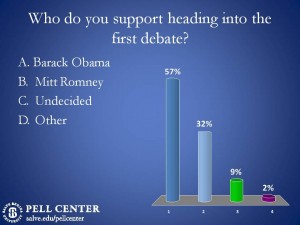Foreign Policy: Is it Relevant to Today’s Politics?
A new election season is always an exciting and vibrant time for the people of the world, but especially for the citizens of the United States of America. The Salve Regina and Newport communities took part in this excitement with an event to watch the first of three debates between Governor Mitt Romney of Massachusetts and President of the United States Barack Obama. To shake things up a bit, the Pell Center for International Relations and Public Policy hosted two guest speakers to discuss the presence of foreign policy in the campaign and its relevance to politics today.
The experts were Michael Auslin, a columnist for the Wall Street Journal, and Michael Cohen, a commentator on American politics and U.S foreign policy. Both men offered varied views of what they believed were the prevalent issues in foreign policy today, though they both agreed that each party has lacked an effective foreign policy plan.
While the two speakers agreed that The United States has lacked an effective foreign policy strategy since the Cold War, they disagreed on the relative merits of the two presidential candidates. According to Cohen, Obama has a solid track record on foreign policy. He cited two examples: the killing of Osama bin Laden, and the removal of American troops from Iraq. Those two achievements, Cohen argued, earned the President the trust of the American public. Because of that trust, Cohen predicted that President Obama will have greater opportunity to do more with his foreign policy in a second term. Romney, in Cohen’s view, is undiplomatic in his foreign policy, and his policy prescriptions seem to strongly resemble those of former President George W. Bush. The public would rather be non-interventionist, said Cohen, who asserted that the country’s ability and appetite to make the world a better place is limited.
Michael Auslin defends a more interventionist approach to U.S. foreign policy, explaining that our country’s moral values are what prompt us to enter onto the world stage.
The environment that the Pell Center enabled to create was one of curiosity, political interest, and even fun. Though there were a mix of Republicans and Democrats, the environment was never hostile. During the question and answer session, the audience was surveyed; they used clickers to indicate their opinions on certain issues and topics.
Prior to watching the presidential debate, 57% of the audience was in favor of Obama, while 32 % were in favor of Romney. 9% were undecided. 
By the end of the night, after the debate, 47% supported Obama, and 44% supported Romney.
This eliminated the twenty percent difference from the last poll, but consideration must be made that not everyone who voted in the first round was around for the second round of polling. When asked which issue was most important to them prior to the debate, the audience chose “economic recovery” with40% of the vote.
Healthcare and the national debt followed in a tie for the second most important issues. On the question of who will best address the national debt; the audience was split; 46% voted Obama, and 46% voted Romney.
In all, the night was a success. Auslin and Cohen helped to inspire a great mixture of both passion and reason within the audience, which ranged from twenty year old college students voting in their first presidential election, to other citizens who have had more opportunities to vote. The debate last week proved that ninety minutes is a lifetime in politics. With three weeks to go, it is anybody’s race.
